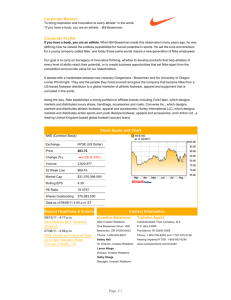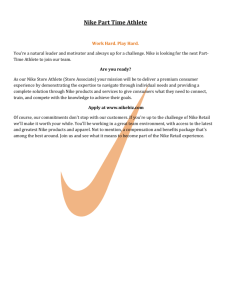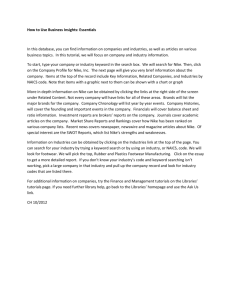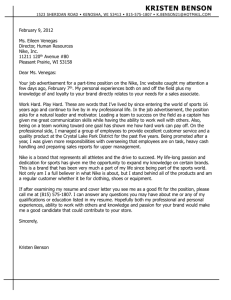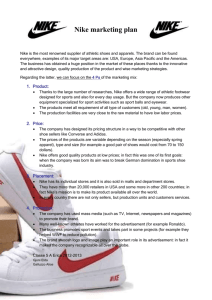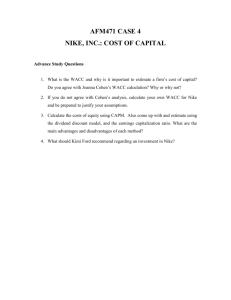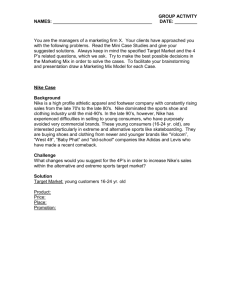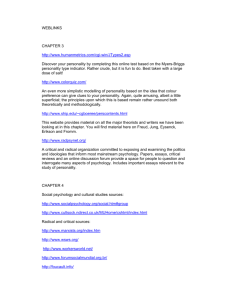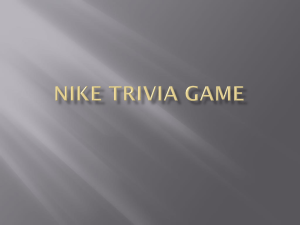Articles related to Sophia's interview
advertisement
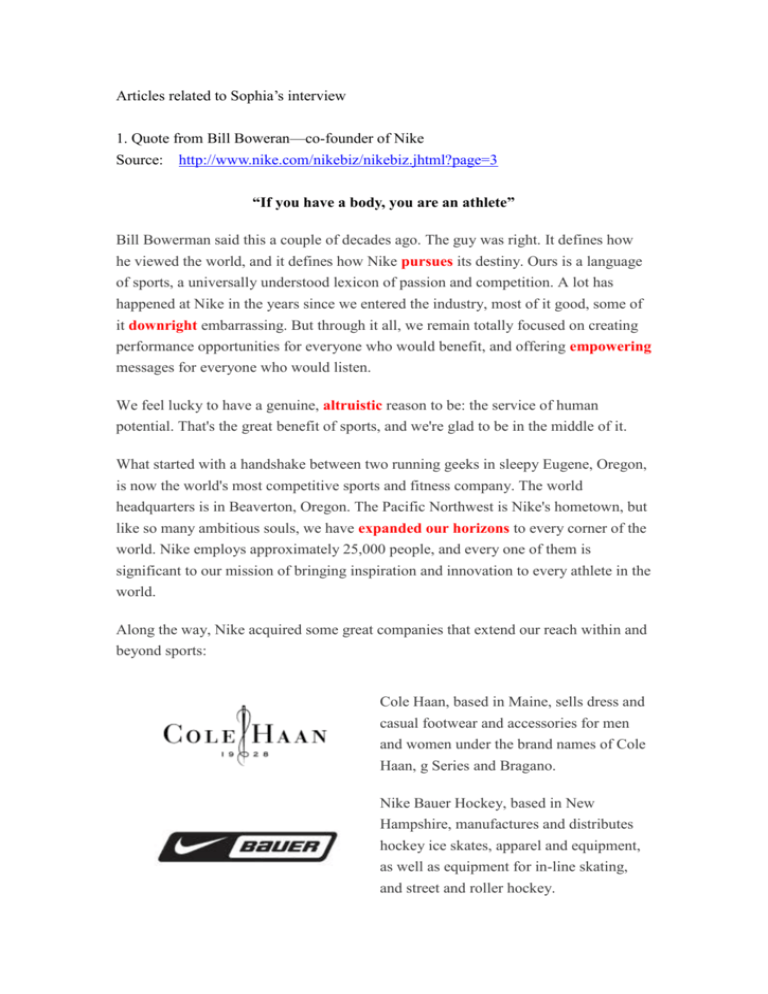
Articles related to Sophia’s interview 1. Quote from Bill Boweran—co-founder of Nike Source: http://www.nike.com/nikebiz/nikebiz.jhtml?page=3 “If you have a body, you are an athlete” Bill Bowerman said this a couple of decades ago. The guy was right. It defines how he viewed the world, and it defines how Nike pursues its destiny. Ours is a language of sports, a universally understood lexicon of passion and competition. A lot has happened at Nike in the years since we entered the industry, most of it good, some of it downright embarrassing. But through it all, we remain totally focused on creating performance opportunities for everyone who would benefit, and offering empowering messages for everyone who would listen. We feel lucky to have a genuine, altruistic reason to be: the service of human potential. That's the great benefit of sports, and we're glad to be in the middle of it. What started with a handshake between two running geeks in sleepy Eugene, Oregon, is now the world's most competitive sports and fitness company. The world headquarters is in Beaverton, Oregon. The Pacific Northwest is Nike's hometown, but like so many ambitious souls, we have expanded our horizons to every corner of the world. Nike employs approximately 25,000 people, and every one of them is significant to our mission of bringing inspiration and innovation to every athlete in the world. Along the way, Nike acquired some great companies that extend our reach within and beyond sports: Cole Haan, based in Maine, sells dress and casual footwear and accessories for men and women under the brand names of Cole Haan, g Series and Bragano. Nike Bauer Hockey, based in New Hampshire, manufactures and distributes hockey ice skates, apparel and equipment, as well as equipment for in-line skating, and street and roller hockey. Hurley International, based in California, designs and distributes a line of action sports apparel for surfing, skateboarding and snowboarding, and youth lifestyle apparel and footwear. Converse, based in Massachusetts, designs and distributes athletic and casual footwear, apparel and accessories. Exeter Brands Group, based in New York, includes the Starter, Team Starter and Asphalt brand names and is the master licensee of the Shaq and Dunkman brands. The Exeter Brands Group is devoted to designing and marketing athletic footwear and apparel for the value retail channel. As small as we feel, the Nike family is a fairly vast enterprise. We operate on six continents. Our suppliers, shippers, retailers and service providers employ close to 1 million people. The diversity inherent in such size is helping Nike evolve its role as a global company. We see a bigger picture today than when we started, one that includes building sustainable business with sound labor practices. We retain the zeal of youth yet act on our responsibilities as a global corporate citizen. If you have a body, you are an athlete. And as long as there are athletes, there will be Nike. Vocabulary List 1. pursue 追求,追趕。 2. downright 完全的,十足的。 3. empowering 授權的。 4. altruistic 利他的,利他主義的。 5. expanded our horizons 拓展視野。 6. apparel 衣服,衣著。 2. History of Nike Source: http://www.nike.com/nikebiz/nikebiz.jhtml?page=5 Bowerman, the inimitable University of Oregon coach, brought jogging to America, built an unrivaled track and field program at that university, and taught his athletes to seek the competitive advantage everywhere - in their bodies, their gear and their passion. Phil Knight was a University of Oregon accounting student and a middle-distance runner under Bowerman. In 1962, Knight had this you're-crazy-it-will-never-work-or-someone-would-already-be-doing-it idea about bringing low-priced, high-tech athletic shoes from Japan to dislodge German domination of the US athletic footwear industry. He met with representatives of Onitsuka Tiger in November of 1962, got his first footwear samples in December of 1963, and showed them to Bowerman in January of 1964. A week later, Bowerman and Knight formed a partnership, with each pledging to kick in $500; they shook hands and started importing. Pretty soon, shoes from Onitsuka Tiger started showing up on American feet, brought into the US by some nobody company named Blue Ribbon Sports. This scenario was bound to pass by the wayside. Bowerman was always seeking ways to improve Tiger designs, and Knight never could stand the thought of shilling for somebody else when he could shill for himself. Soon enough, BRS gave way to a new approach to winning the throne in the US running market. This time, it would be with new designs and a new company, Nike. Two more key players helped propel the company's early growth: Jeff Johnson, a runner and anthropology major whom Knight met while earning his MBA at Stanford, and Steve Prefontaine, like Knight a University of Oregon runner and, unlike Knight, a middle-distance running prodigy. Johnson joined Knight and Bowerman's Blue Ribbon Sports company as its first full-time employee, selling shoes out of the back of his van at high school track meets in 1965. In 1966, Johnson opened the company's first retail outlet in a narrow building at 3107 Pico Blvd., in Santa Monica, California. Johnson is credited with giving Nike its name. Prefontaine, the first major track athlete to wear Nike product, had significant influence on the design of Nike's running shoes. His indomitable spirit and legendary competitive passion left an indelible mark on the company. Decades later, Nike is the largest sports and fitness company in the world. Vocabulary List 1. inimitable 無法仿冒的,獨特的。 2. dislodge 用力移動;逐出。 3. scenario 事態,局面。 4. prodigy 奇才,奇蹟。 3. Working for an International Company Source:http://www.jobweb.com/resources/library/International/Working_for_an_187_0 1.htm By Steve McKinney Going Global Guest Columnist Working in an international company can be an exciting, challenging, and culturally enriching experience. But there are some key differences between working in a multinational firm and a local company—differences that can make a big impact on your job satisfaction, career path, and the relationships you make with your colleagues. At a multinational firm, employees come from all over the world—bringing different languages, cultural traditions, and ethnic backgrounds with them. If you join an international company, your colleagues will probably speak English at some level, as well as the country’s native language. Working in a multilingual environment is a great opportunity to meet a diverse group of people, gain international business experience, and improve your foreign language skills. A good sense of humor comes in handy when you’re working with an international firm—especially if you’re conducting business in several different languages. Your co-workers may have different business philosophies, working habits, and communication styles. Cultural differences can be confusing, and accordingly, many multinational firms promote a more relaxed environment to allow for different work and leadership styles. Patience, understanding, and effective communication skills will help you establish stronger working relationships with foreign colleagues, and get the most out of your international experience. You may also have more personal development opportunities at a multinational company than you would at a domestic firm. Many international companies have offices all over the world, and their employees may spend a year or two working abroad. If you’re thinking about joining an international firm and are interested in working abroad, ask about potential employment exchange opportunities at the company’s foreign offices. Before applying to a multinational company, seek out friends, acquaintances, and other contacts that have experience in an international working environment. Ask about their day-to-day work schedule, their boss and co-workers, and the general culture and atmosphere of the firm before you decide whether working in an international environment might be the right choice for you. Steve McKinney is the president and CEO of McKinney Consulting Inc., an executive search company serving multinational clients, and the co-chairman of the Living in Korea Committee of the American Chamber of Commerce. He can be reached at steve@mckinney-consulting.com. This article was originally published in The Korea Herald, 11/9/2001, p. 11. Vocabulary List 1. colleagues 同事。 2. ethnic backgrounds 種族背景。 3. promote 提倡。 4. potential 潛力的,可能的。 5. acquaintances 熟人,(與人)相識了解。
